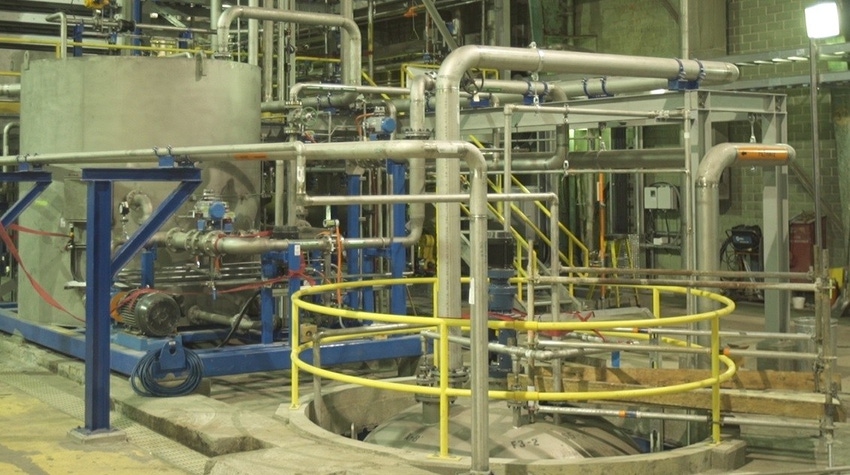Alberta pulp mill produces technical lignin designed to replace petrochemicals
April 6, 2016

Alberta boasts the first commercial-scale plant in Canada to extract lignin, the natural polymer in wood that binds cellulose fibers together to give a tree its structural integrity, for use in the development of sustainable new value-added products. The new commercial demonstration plant, built by West Fraser, a diversified forest products company with operations across Western Canada, has a capacity of 30 metric tons a day.
West Fraser has built the facility at its softwood Kraft pulping operation in Hinton, Alberta. The Kraft process is a chemical pulping process that makes a very strong pulp. This process produces a byproduct that is known as as black liquor, which is made up of pulping residues such as lignin and hemicellulose, as well as chemicals from the Kraft process. These chemicals are recovered and reused. Now Kraft lignin, as a tree-derived source of aromatic phenol, is arousing increasing interest, as recognition of its economic potential as a ‘green’ chemical feedstock grows.
 At the new plant, West Fraser will divert a portion of the black liquor and extract high-purity lignin using a proprietary process developed in Canada with FPInnovations and NORAM Engineering, called the LignoForce System(TM). The Hinton facility is the first commercial-scale implementation of this new technology. The aim is to use the lignin to replace fossil fuel sourced petrochemicals
At the new plant, West Fraser will divert a portion of the black liquor and extract high-purity lignin using a proprietary process developed in Canada with FPInnovations and NORAM Engineering, called the LignoForce System(TM). The Hinton facility is the first commercial-scale implementation of this new technology. The aim is to use the lignin to replace fossil fuel sourced petrochemicals
Lignin moreover represents a significant diversification opportunity for the forest product industries to derive greater value from a residual by-product.
“It’s a novel product, and a natural polyol,” said Dr. Eddie Peace, Bioproducts coordinator at West Fraser, speaking at the International Conference on Bio-based Materials in Cologne (Germany) today. “The market is still evolving, but we saw opportunities in establishing commercial-scale availability. And as we’re a business, we explored the idea with our customers to get their feedback prior to starting the project, in order to find out whether there would be any market at all for the product.”
The $30-million plant - made possible through joint funding by industry and government - began production in March. Alberta Innovates Bio Solutions (AI Bio) awarded West Fraser a $3-million innovation grant. The funding agreement includes a provision for the company to contribute $1.5 million into a "lignin research fund."
production in March. Alberta Innovates Bio Solutions (AI Bio) awarded West Fraser a $3-million innovation grant. The funding agreement includes a provision for the company to contribute $1.5 million into a "lignin research fund."
The provincial portion was leveraged with investments from West Fraser and federal government sources, including Natural Resources Canada and Sustainable Development Technology Canada.
In the near term, West Fraser will develop the use of lignin as a natural adhesive in its engineered wood products - as a renewable substitute for the petroleum-based phenol-formaldehyde resin currently used in the engineered wood products it manufactures.
“While the biggest driver for the project was displacing petroleum equivalents, another major driver was our internal market, that supports the project. We’ve set modest replacement targets in plywood suggested by the value proposition,” said Peace. “We will extend these to our other engineered wood products – strandboard, MDF - at a later date.”
Ultimately, other potential applications to be targeted include polyols, plastics, chemicals, including surfactants and dispersants, fine chemicals (such as vanillin), and biocomposites.
Ted Seraphim, president and CEO of West Fraser, said the company recognizes the strategic importance of continuing to develop the company in a manner that fully utilizes the forest resource. West Fraser has been at the forefront in bioenergy and bioproduct development in Western Canada and the lignin project is the next step – and a starting point for next generation chemistries.
"Lignin is an opportunity to expand our product line and recover the maximum value from our fiber and our manufacturing process," Seraphim said. Adding: "This technology has the potential to be a new product offering for all pulp mills in Canada. In addition, it is a sustainable choice. Every ton of lignin substituted in phenol-formaldehyde resin prevents a ton of CO(2) emissions from entering the atmosphere.”
Photos inside Hinton pulping plant courtesy of Alberta Innovates - Bio Solutions
About the Author(s)
You May Also Like


